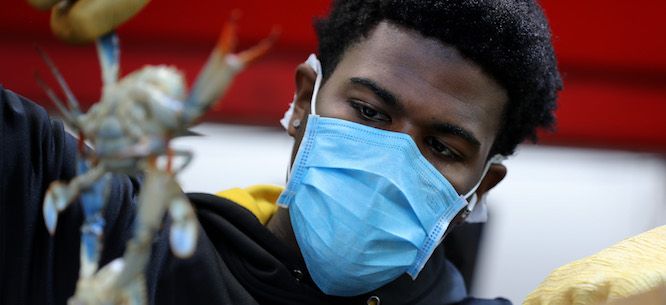Seafood Workers Call for PPE
Seafood Workers Call for PPE
“I want to remind the owners of the factories that they’re the ones who can save our lives.”

[contentblock id=coronavirus]
The food supply chain has been shaken by the coronavirus pandemic, mainly in meatpacking plants where workers have suffered devastating outbreaks. But the seafood supply chain is potentially facing an even greater disruption; the global seafood trade is extremely volatile, and fish processors are highly dependent on wholesale networks that are now upended by the mass closure of restaurants. And just like meatpacking workers, workers at seafood processing plants—where fish and shellfish are cleaned and sorted over long, exhausting shifts—workers are getting sick, and they are worried.
Yolanda, a codfish cleaner at Eastern Fisheries in New Bedford, Massachusetts, is not sure how many of her coworkers have been infected with COVID-19. “The supervisor doesn’t really tell us anything, but from what I know personally, there were at least three people who were positive,” she said through a translator. “But I don’t know the exact number because nobody tells us.”
She became one of them in early April. After coming down with symptoms of the virus—coughing, fever, aches, and loss of taste—she informed her supervisor, who then told her to stay at home and get tested. After she tested positive, she said, she was ordered to quarantine herself at home.
Yolanda stayed away from work for two weeks. But socially isolating from her family, with three young daughters, in a single room of their home “was very difficult . . . because we didn’t really know what we were going to be able to do in order to take care of the children.” Her husband, who works in landscaping, has also been without work for two months.
She has since returned to work, but the illness has left a deep hole in the family’s finances. “It’s very difficult,” Yolanda said. “Because there are bills and bills and bills that come, there’s rent to pay, and so I was very sad. But now that I’ve returned to work, we’re trying to put things together little by little to pay the bills.”
Like many immigrant workers in the food-chain workforce, Yolanda is supporting more people than her immediate family. Before the economic lockdown, she said, she and her husband were sending money to both sets of their parents every two months. “But now we can’t send any money to Guatemala, because we need all of the money that we have for our expenses here.”
The Eastern Fisheries website claims that it is carrying out “additional factory sanitizing and cleaning throughout the day” and following both local and federal disease-control guidance. Yolanda said the company had told workers it would shut down for cleaning after any worker tested positive. But as of early May, the factory had only been closed for one day, she said, and it remained open while she was in quarantine.
One bright spot in Yolanda’s ordeal is that she finally received back pay—a month late—for the time she took off, thanks to a recently passed federal coronavirus relief law that mandates fourteen days paid sick leave for employees quarantined or experiencing symptoms, in firms with fewer than 500 workers. But labor advocates report that many other workers in the industry have had difficulty accessing paid leave despite the new legal protections.
The legal rights of workers like Yolanda are complicated by the fissured employment structure. Many at Eastern Fisheries are technically employed through a separate temporary labor agency, BJ’s Service Company. This system, according to the labor legal advocacy group Justice at Work, allows bosses to flout labor and safety standards.
The seafood processing industry on the southern Massachusetts coast has long been criticized by labor advocates for poor safety conditions and dismally low wages. The widespread use of temp agencies keeps the workforce, many of them Latinx immigrants, relegated to precarious, often dangerous jobs.
Following weeks of protest about poor working conditions from the workers’ advocacy coalition Pescando Justicia, the City of New Bedford issued two emergency orders in early May ordering industrial workplaces to monitor workers’ temperatures daily, provide face masks, and ensure that workers are safely distanced or separated by physical barriers. So far, according to Justice at Work, the seafood companies’ adherence to these new policies has been mixed.
Beyond the safety hazards, for many of Yolanda’s fellow workers, the main concern is holding onto their jobs. “It’s difficult to talk to my fellow workers,” she said, “because they are afraid they’re going to lose their jobs . . . we as Hispanic people have a lot of fear, [so it’s] very hard to talk about this.”
Seafood worker Juan Carlos Carranza, who has helped organize others to petition for improved workplace safety protections, said through a translator, “I want to remind the owners of the factories that they’re the ones [who] can save our lives, especially if they can immediately fix the conditions at our plant. It’s about human rights, and it’s also about public health.”
Michelle Chen is a member of Dissent‘s editorial board and co-host of its Belabored podcast.




